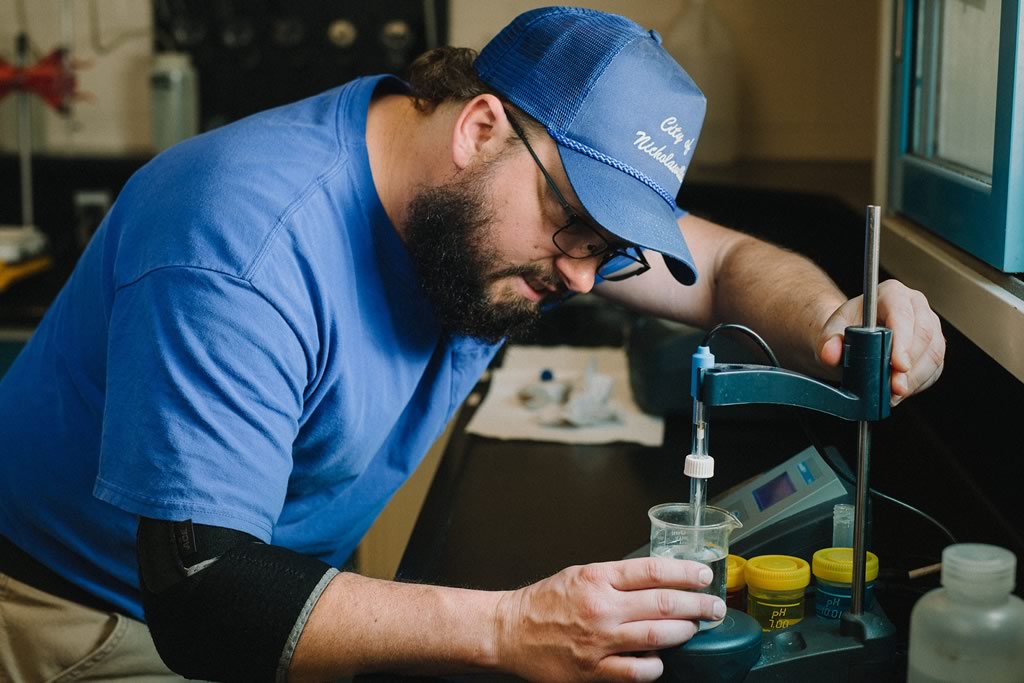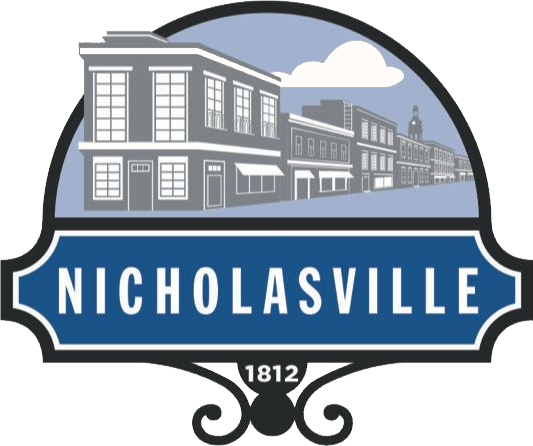Welcome to the
City of Nicholasville!
Where we share the good life.
Water Treatment
Nicholasville’s water treatment plant draws surface water from Pool 8 of the Kentucky River for treatment. The existing plant is a conventional turbidity removal plant that utilizes chemical coagulation, flocculation, settling and filtration to remove suspended particles from the raw water.
The following is a brief and simplified description of the various treatment processes, which are utilized within the Nicholasville Water Treatment Plant.


Raw Water Pumping
Untreated water is pumped from the Kentucky River (approximately 330 feet vertically) to the plant for treatment. Raw water pumping facilities consist of three intake/pumping towers, each of which supports two vertical turbine pumps. The newest tower, constructed in the 1990-1992 expansion, has the capability to withdraw water at a depth of 10 feet below river pool stage (allowing maximum utilization of pool storage during a drought).
Chemical Mix Basin
The raw water enters a high energy-mixing chamber where it is treated with several chemicals for a variety of purposes.
The primary coagulant, which is added to aid in the removal of fine suspended solids, is polyaluminum chloride or PAC, which has a specific gravity of 1.29. Since these solids by themselves, are too small to be removed from the water by gravitational settling within a practical period of time, a coagulant is added to increase particle size and weight, thus improving solids removal during the sedimentation and filtration processes.
A liquid polymer is also added as a coagulant aid to increase the efficiency of the coagulation process, and to help remove Total Organic Carbons, or TOC’s.
Potassium permanganate can also be added as an oxidant to reduce taste and odor form several naturally occurring organic formations found in the Kentucky River such as algae growth during the summer months.
Powdered activated carbon is also available to be fed for occasional taste and odor problems or possible chemical spills in the Kentucky River.
The plant has the capability to feed either chlorine or chloramines for disinfection. These chemicals are used to destroy or inactivate potentially harmful bacteria and other microorganisms in the water, and also to provide residual disinfection within the distribution system.
Flocculation Basins
The PAC reacts with the natural alkalinity of the water to form a gelatinous precipitate. As the water passes through the flocculation mixing chambers, this gelatinous precipitate entraps the fine suspended solids and forms larger and denser masses called “floc”.
Water is gently mixed in the flocculation basins with “stirring paddles” which facilitate the creation of larger “floc” particles as the suspended solids come into contact with each other.
Settling Basins
From the flocculation basins, the water flows to settling basins where quiescent settling conditions permit the “floc” to settle out of the water. To facilitate more efficient settling, each basin is equipped with “tube settling” modules. The clarified water is collected in weir troughs and is conveyed to the filters.
Water is gently mixed in the flocculation basins with “stirring paddles” which facilitate the creation of larger “floc” particles as the suspended solids come into contact with each other.
Filtration
After the treatment process of coagulation and sedimentation, the clarified water flows into dual media filter beds to remove any remaining solids.
The filter beds are constructed of layers of anthracite, filter sand, and supportive gravel. Twenty inches of anthracite having an approximate diameter of 1.0 mm rest over ten inches of fine sand with an average diameter of 0.5 mm.
As the water passes down and through the filters, the remaining suspended solids become entrapped in the interstices of the filter media. At routine intervals, the filters are cleaned of the entrapped solids by forcing clear, finished water in the reverse direction at high velocities. This reverse flow is called backwashing and is required to remove the build-up of captured solids within the upper levels of the filter media.
The Nicholasville Water Treatment Plant has six filters. The four older filters each have a rated capacity of .75 MGD and the two newest filters have a rated capacity of 1.5 MGD each.
After filtration, fluoride is added to the treated water to improve dental hygiene. Chlorine (or chloramines) is added after filtration for disinfection.
Corrosion Control
After filtration, zinc orthophosphate, a corrosion inhibitor is added to inhibit the leaching of lead and copper from the pipes in your homes, by creating a thin film on your pipes.
Finished Water Storage and Pumping
Following filtration, the treated water is temporarily stored in concrete reservoirs called “clear wells”. The Nicholasville Water Treatment Plant has four clear wells with a combined storage capacity of over 900,000 gallons. From the clear wells, the treated water is pumped directly to the Nicholasville water distribution system.
Instrumentation
Plant operations are monitored and controlled by a computer based Supervisory Control and Data Acquisition (S.C.A.D.A.) system. The S.C.A.D.A. system monitors and controls pumps, chemical feeds, treatment equipment, flow rates, water levels, etc.
Water Quality Monitoring
Continuous water quality testing is performed at the Nicholasville Water Treatment Plant. Water is tested for turbidity, alkalinity, hardness, iron, manganese, fluoride, pH, corrosiveness, and disinfectant residual.
Utility Customer Service and Emergency Contact
| Travis Ward |
| Utilities Business Manager |
| 517 N. Main Street Nicholasville, KY 40356 |
| 859.885.9473 |
| travis.ward@nicholasville.org |
| Danica McCoy |
| Utility Customer Service |
| 601 N. Main Street Nicholasville, KY 40356 |
| 859.885.9473 |
| danica.mccoy@nicholasville.org |
| Water Services |
| City of Nicholasville Water |
| 601 N. Main Street Nicholasville, KY 40356 |
| 859.885.9473 |
| Emergency Line 859.885.7305 (After 4 p.m.) |
| Water Services |
| Jessamine Water District # 1 |
| 2225 Lexington Road Nicholasville, KY 40356 |
| 859.885.9314 |
| Water Services |
| Jessamine South Elkorn Water |
| 802 S. Main Street Nicholasville, KY 40356 |
| 859.881.0589 |
Nicholasville, KY 40356
City News & Updates
The latest Nicholasville, KY news, articles, and resources can always be found right here on our website.
© 2023 The City of Nicholasville, KY. All Rights Reserved.
Connect With Us

